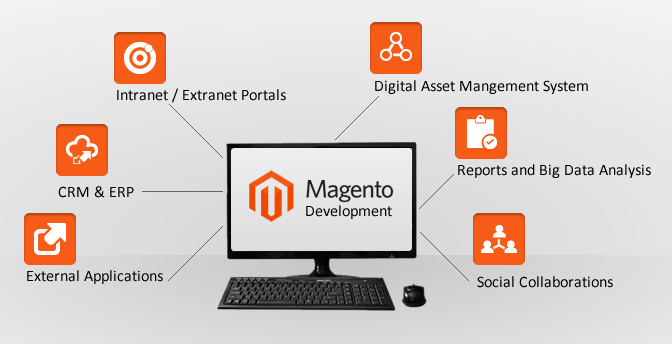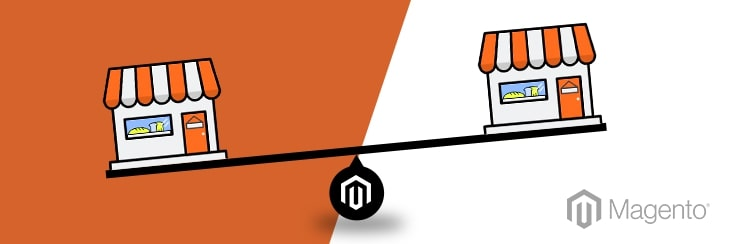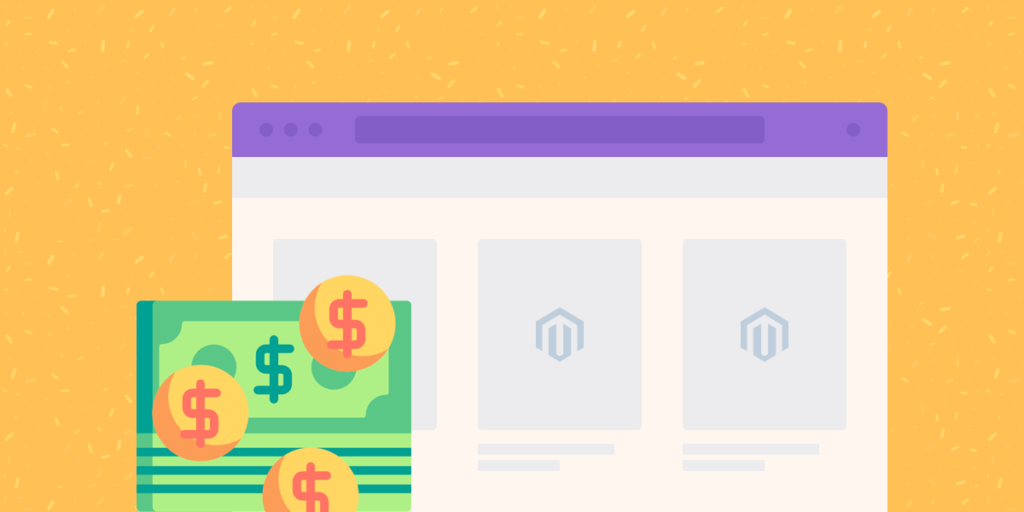Advantages and Disadvantages of Building a Website in Magento
Welcome to the e-commerce world, where building a stunning website is an essential step towards success. If you're considering creating your online store, chances are you've come across Magento as one of the top contenders in the game. But what exactly is Magento? And more importantly, what advantages and disadvantages does it bring to the table?
So whether you're a budding entrepreneur or an established business owner seeking new horizons in digital commerce, join us on this journey as we explore the pros and cons of building a website in Magento. Let's dive right in!

What is Magento?
Magento is an open-source e-commerce platform that provides businesses with a robust and flexible foundation for building online stores. It was first introduced in 2008 by Varien Inc., and has since gained widespread recognition and popularity within the e-commerce community.
One of Magento's standout features is its scalability. Whether you're running a small boutique or managing a large enterprise-level operation, Magento can accommodate your needs. From product catalog management to inventory tracking, order processing, and customer relationship management, this platform offers a comprehensive suite of tools to support all aspects of your online business.
Another key advantage of Magento is its customization capabilities. With thousands of themes and extensions available in the marketplace, you can tailor your website design to align perfectly with your brand identity and provide users with an exceptional shopping experience. Moreover, the flexibility of Magento allows developers to create custom modules and integrations based on specific business requirements.
In addition to its functionality, Magento also boasts excellent SEO capabilities. The platform includes built-in features such as search engine-friendly URLs, metadata optimization options, sitemaps generation, layered navigation for easy filtering, and more all contributing to higher visibility in search engine rankings.
With its vast community support network offering regular updates and security patches, Magento ensures that your website stays up-to-date with technology advancements while keeping it secure from potential threats.
What sets Magento apart is its ability to handle complex e-commerce tasks seamlessly while providing businesses with endless possibilities for growth through customization options making it a top choice for companies looking to establish their presence in the digital landscape. So if you're ready to take your ecommerce agency or online business aspirations to new heights why not give Magento a try?

How to create a website in Magento?
Creating a website in Magento involves several steps, from setting up the environment to designing and configuring your online store. Here's a general guide to help you get started:
- Prerequisites:
- A domain name: Choose and register a domain name for your website.
- Web Hosting: Choose a hosting provider that meets Magento's system requirements.
- SSL Certificate: Obtain an SSL certificate to secure your website (highly recommended for online stores).
- Install Magento:
- Download the latest version of Magento from the official website.
- Upload the Magento files to your server using FTP or your hosting provider's file manager.
- Create a MySQL database and user for your Magento installation.
- Run the Magento setup wizard through your browser and follow the installation instructions.
- Configure Magento:
- Log in to the Magento admin panel (located at yourdomain.com/admin).
- Go through the initial setup wizard to configure your store settings, such as the store name, currency, time zone, etc.
- Set up payment gateways and shipping methods suitable for your business.
- Configure tax settings based on your business requirements and location.
- Select a Theme:
- Magento offers various free and premium themes. Choose a theme that suits your business and products.
- Customize the theme according to your branding requirements.
- Add Products:
- Add your products to the Magento catalog.
- Include product descriptions, images, prices, and any other relevant information.
- Extensions and Modules:
- Explore the Magento Marketplace for extensions and modules that add specific functionality to your website, such as social media integration, SEO optimization, and more.
- Install and configure the selected extensions as needed.
- Content Management:
- Create static pages like About Us, Contact, Terms and Conditions, Privacy Policy, etc.
- Utilize the built-in CMS (Content Management System) features of Magento to create and manage additional pages.
- Test the Website:
- Thoroughly test your website's functionality, usability, and performance across different devices and browsers.
- Ensure all features like cart, checkout, and payment processing work correctly.
- Security and Backups:
- Implement security measures like changing default URLs, setting strong passwords, and keeping the Magento installation up to date.
- Regularly back up your website and database to prevent data loss.
- Launch:
- After all testing is completed, you can launch your Magento website to the public.
- Monitor its performance and make any necessary adjustments.
Remember that development process of creating a successful e-commerce website requires continuous improvement and adaptation based on user feedback and market trends. Magento provides a powerful platform, but it's essential to keep updating and refining your site to meet your customers' needs and provide an excellent user experience.
Advantages of Magento
1. Highly customizable: One of the biggest advantages of using Magento for website development is its high level of customization. With Magento's robust and flexible architecture, you can tailor your website to meet your specific business requirements. From design elements to functionality, you have full control over how your online store looks and functions. 2. Scalability: As your business grows, so does the need for a scalable platform that can handle increased traffic and transactions. Magento offers scalability options that allow your website to grow with your business needs. Whether you have a small startup or a large enterprise, Magento can accommodate thousands of products and handle heavy traffic without compromising performance. 3. SEO-friendly: Having an SEO-friendly website is crucial in today's competitive online landscape. Luckily, Magento provides built-in features that optimize your site for search engines such as meta tags, URL rewrites, sitemaps, and more. This helps improve visibility in search results and drives organic traffic to your e-commerce store. 4.Excellent user experience: User experience plays a vital role in determining the success of an e-commerce site. With Magento's intuitive interface and user-friendly navigation system, customers can easily find what they're looking for and make seamless purchases. The platform also supports multiple payment gateways, making it convenient for customers to complete transactions. 5.Vast extension marketplace: Another advantage of using Magento is its extensive marketplace for extensions and plugins.These extensions allow you to enhance the functionality of your website by adding features like advanced analytics tools, multi-language support and social media integration.
Disadvantages of Magento
1. Complexity: One of the main disadvantages of building a website on Magento platform is its complexity. The platform can be quite challenging for beginners, requiring technical expertise and coding knowledge to set up and customize the website effectively. This can be overwhelming for small businesses or individuals who do not have access to a dedicated development team.
2. Cost: Another drawback of Magento is its cost. While there is a free open-source version available, it may not meet all the requirements of your online store. To unlock advanced features and functionalities, you may need to invest in paid extensions or upgrade to the enterprise edition, which comes with a hefty price tag.
3. Performance Issues: Magento websites are known for their robustness but often struggle with performance issues if not optimized properly. Slow loading times can result in poor user experience and lower search engine rankings, potentially leading to reduced traffic and sales.
4. Hosting Requirements: Magento has specific hosting requirements that demand powerful servers capable of handling high volumes of traffic and processing complex operations efficiently. Finding a reliable hosting provider that meets these requirements without breaking the bank can be challenging.
5. Updates and Maintenance: Keeping your Magento website up-to-date requires regular updates for security patches, bug fixes, and new features releases - all of which require time-consuming maintenance tasks that may require technical expertise.
While there are certainly disadvantages associated with using Magento as your ecommerce store, it's important to consider them alongside its numerous advantages before making a decision about building your own ecommerce website in this popular framework.

How much does it cost to build a Magento site?
The cost of building a Magento site can vary significantly based on several factors, such as the size and complexity of the website, the features and functionalities you want to include, the level of customization required, the experience and rates of the developers or development agency, and the region or country where the magento development services or work is done.
Here are some cost components to consider when estimating the cost of building a Magento store:
- Development and Design: This includes the cost of designing the website's look and feel, customizing a Magento theme, and implementing the desired features. The cost will depend on the complexity of the design and the number of customizations needed.
- Extensions and Modules: If you plan to use premium extensions or custom-developed modules to add specific functionalities to your website, there will be additional costs associated with licensing or development.
- Hosting and Infrastructure: Magento requires robust hosting to handle the demands of an e-commerce site. The hosting cost will depend on factors like server resources, traffic, and whether you opt for shared hosting, VPS, or dedicated servers.
- SSL Certificate: An SSL certificate is crucial for secure online transactions. The cost varies depending on the type and provider of the certificate.
- Payment Gateway and Security: Integrating payment gateways and ensuring the site's security might involve additional costs.
- Content and Data Entry: If you have a large catalog of products, adding them to the Magento site will require time and effort, which may translate to additional costs if outsourced.
- Maintenance and Support: Post-launch, you'll need to budget for ongoing maintenance, updates, and support to keep your site running smoothly and secure.
As a rough estimate, a small to medium-sized Magento site with basic features and a pre-designed theme could cost anywhere from $5,000 to $20,000. However, more extensive and highly, fully customized magento theme and e-commerce websites with advanced features could cost upwards of $50,000 or even more.
For an accurate cost estimate, it's best to discuss your specific requirements with certified Magento developers or development agencies. They can provide you with a detailed quote based on your project's scope and specifications. Always remember that investing in a well-designed and functional Magento site can pay off in the long run, as it will help attract customers and facilitate smooth online transactions.

How to Choose the Right Magento Hosting Provider
Choosing the right Magento hosting provider is a crucial decision that can greatly impact the performance and success of your website. With so many options available choose magento now, it's important to carefully consider your needs and priorities.
You should evaluate the scalability and flexibility offered by different hosting providers. As your business grows, you'll need a hosting solution that can handle increased traffic and accommodate future expansion.
Another important factor to consider is the level of security provided by the hosting provider. Your customers' data must be protected from potential threats, so look for features like SSL certificates and regular security updates.
Furthermore, take into account the reliability and uptime guarantee offered by each provider. A reliable host ensures that your website will be accessible to visitors at all times without any downtime or interruptions.
By carefully evaluating these factors, you can choose the right Magento hosting provider that meets your specific requirements and sets up a solid foundation for your online presence.
